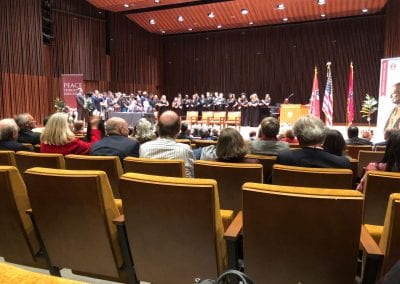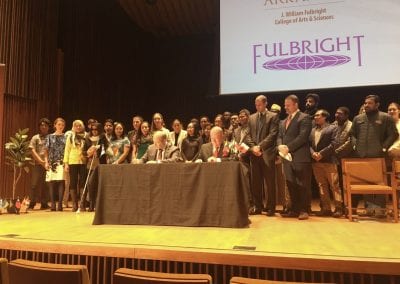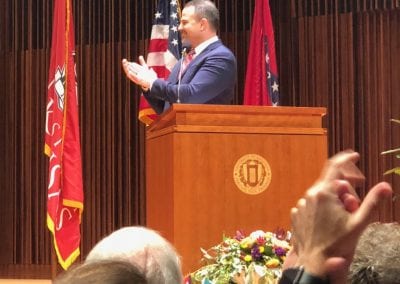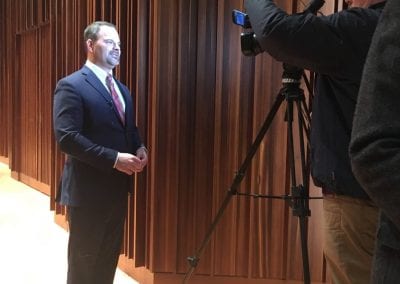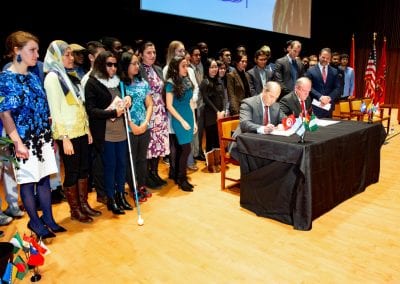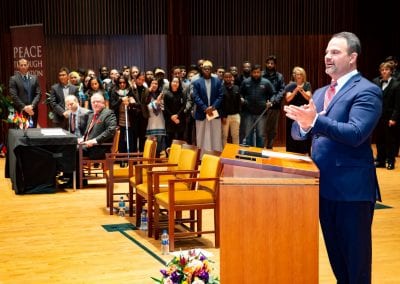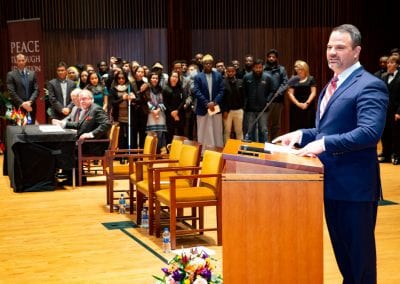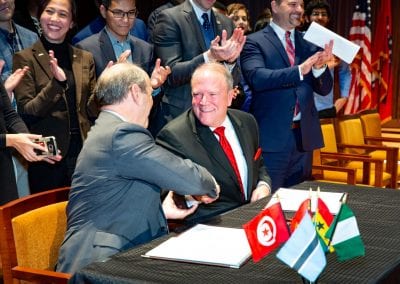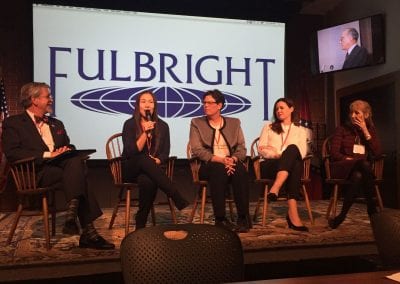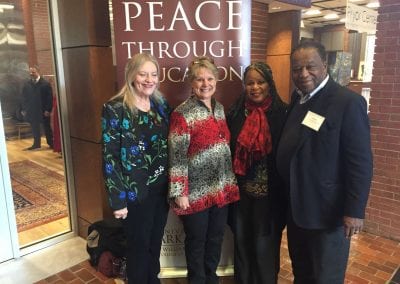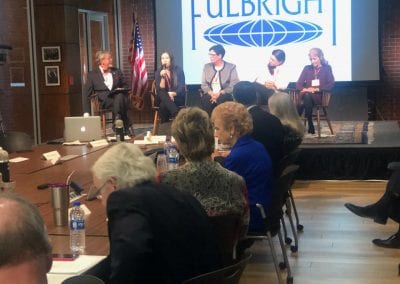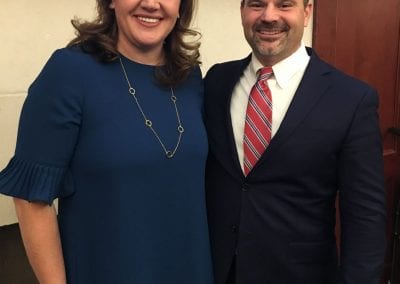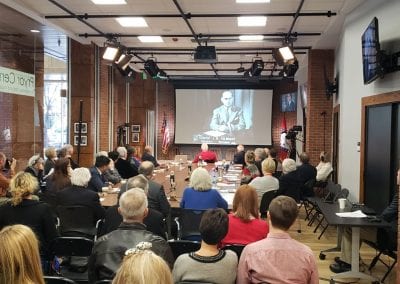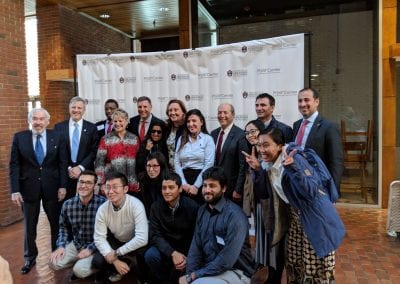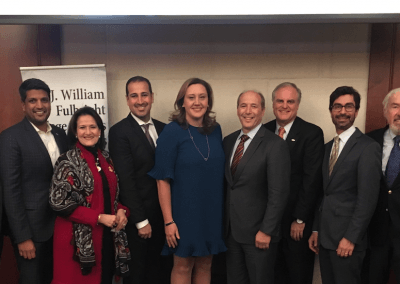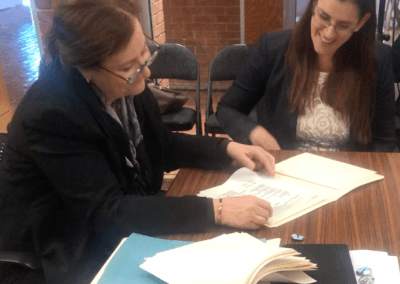Namesake College and Program Celebrate J. William Fulbright’s Legacy, Expand Partnership
During November’s 2018 International Education Week, U.S. Sen. J. William Fulbright’s namesake college and his namesake program came together in Fayetteville to honor his legacy and celebrate their partnership.
And on Nov. 14, 2018, the State Department’s J. William Fulbright Foreign Scholarship Board and University of Arkansas and its J. William Fulbright College of Arts and Sciences reaffirmed and expanded their partnership with a formal signing ceremony.
“The expanded partnership between these two groups will strengthen the tie between the international ‘Fulbright Family’ and Senator Fulbright’s namesake college, creating a new era of collaboration,” said Mark Waldrip, chair of the University of Arkansas System Board of Trustees.
“This will enhance the program and its focus on international exchange, while building stronger ties with the University of Arkansas System, and the state of Arkansas as a whole.”
The expanded partnership is part of the Fulbright Foreign Scholarship Board’s ongoing efforts to work with U.S. higher education institutions. The Board will take the following steps to recognize the Fulbright Program’s history and continued development:
- The Fulbright Foreign Scholarship Board will work with the U of A’s Fulbright College, the Fulbright Association, other higher education institutions, and other stakeholders to compile a list of living Fulbright Program alumni, and oral and visual histories of interested “Fulbrighters,” to sustain the Fulbright community and the legacy of the program.
- The Board expresses its support for the U of A’s ongoing efforts to make its numerous J. William Fulbright papers and other memorabilia available to all and will further encourage newly-appointed board members to travel to the U of A to learn about the history of J. William Fulbright and the Fulbright Program.
- The Board intends to hold one of its quarterly board meetings at the U of A’s Fulbright College at least once every three years, and these meetings will include sessions on the life of J. William Fulbright, with a special emphasis on providing first-person narratives and historical context for the creation of the exchange program.
View UATV’s Facebook Live recording of the signing, and check out this photo gallery:
Sen. Fulbright wrote the legislation that established the Fulbright Foreign Scholarship Exchange Program in 1946. Since then, the Fulbright Program has become one of the most competitive and prestigious scholarship programs in the world, receiving overwhelming bipartisan support.
In Fulbright’s words, “educational exchange is not merely one of those nice but marginal activities in which we engage in international affairs, but rather, from the standpoint of future world peace and order, probably the most important and potentially rewarding of our foreign-policy activities.”
One of the most exciting aspects of the expanded partnership between the Board and the U of A is its focus on connecting Fulbright Program alumni and telling the stories of “Fulbrighters,” said University of Arkansas Chancellor Joseph E. Steinmetz.
“Inviting a network of Fulbright Scholars from around the globe to share their stories with the U of A for permanent retention in the Fulbright archives will be incredibly rewarding,” he said. “This expanded partnership is a living demonstration of our guiding priorities in action. We are building a collaborative and innovative campus through this connection to the greater ‘Fulbright Family.’”
Recognized globally for fostering understanding between countries and cultures, the Fulbright Program represents more than 160 countries and has had more than 370,000 participants, with 8,000 more chosen each year. The program has produced:
- 59 Nobel Prize winners
- 71 MacArthur Foundation “Genius” Fellows
- 82 Pulitzer prize winners
- 37 current or former heads of state or government.
“The Fulbright Program has accomplished so much for scholarship, research and international understanding,” said Jim Coleman, executive vice chancellor for academic affairs and provost at University of Arkansas. “We are looking forward to providing even greater contributions to the Fulbright program’s next chapter, and embodying Senator Fulbright’s lasting legacy of peace through education.”
For more information about the Fulbright Program, visit eca.state.gov/fulbright and for more information about Fulbright College, visit fulbright.uark.edu.
About the Fulbright Foreign Scholarship Board: Appointed by the President of the United States, the 12-member J. William Fulbright Foreign Scholarship Board was established by Congress to supervise the global Fulbright Program as authorized by the Fulbright-Hays Act of 1961. Representing diverse facets of American society, Board members select students, scholars, teachers, and others from the United States and abroad to participate in Fulbright exchanges. In close relationship with the U.S. Department of State’s Bureau of Educational and Cultural Affairs, U.S. embassies, bilateral Fulbright Commissions in host countries and the U.S. Department of Education’s International and Foreign Language Office of Postsecondary Education, the Board prepares an annual report and promotes the Fulbright Program to audiences around the world. The Board also meets quarterly to establish policies for Fulbright selection and operating procedures.
About the J. William Fulbright College of Arts and Sciences: The J. William Fulbright College of Arts and Sciences is the largest and most academically diverse unit at the University of Arkansas, with three schools, 16 departments and 43 academic programs and research centers. The college provides the core curriculum for all University of Arkansas students and is named for J. William Fulbright, former university president and longtime U.S. senator.
About the University of Arkansas: The University of Arkansas provides an internationally competitive education for undergraduate and graduate students in more than 200 academic programs.
A version of this story also appeared in the U of A’s Newswire publication.


